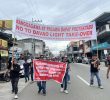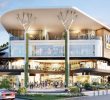DAVAO CITY — Organic food advocates here are encouraging local consumers to try out different varieties of organically grown rice in the local market amidst the growing concern about “fake” rice in the market.
On Sunday, Davao City Mayor Rodrigo Duterte ordered the Crime Investigation and Detection Group (CIDG) to investigate the alleged fake rice.
Rice retailers were also warned by Duterte saying that they will be held accountable if proven that they are selling fake rice.
Duterte said traders should “know their trade”.
“I will not forgive you. If someone (dies), I will sue you,” said Duterte.
Duterte said that illegal suppliers will be charged with economic sabotage under the Anti-Agricultural Smuggling Act.
(Read related story: Duterte orders CIDG to probe fake rice issue)
The Go Organic Davao City network said organically grown rice varieties are healthier options.
“Not only are these organically grown by local farmers, but these rice varieties also have more fiber and nutrients than the average white rice,” said GoDC member Joy Enriquez.
GoDC in its statement said white rice is produced by taking out the bran and germ layer of the rice kernel.
“In contrast, brown rice is produced by taking off its outer layer, called the hull, and leaving the bran and germ layers intact. Almost 90% of the dietary fiber and nutrients such as manganese, niacin, potassium and other essential fats are found in the bran and germ layers,” said GoDC.
Enriquez said that “local organic rice producers like Metsa, Masipag and BiosDynamis have stringent quality control mechanisms which guarantee that their rice produce is organically produced, safe and nutritious to eat.”
“For instance, Masipag’s organic rice is Participatory Guarantee System (PGS)-certified, which means that it has been guaranteed by a local network of organic farmer groups that the rice is organically grown,” Enriquez said.
Enriquez said Masipag has 2,200 organic rice varieties which are “safe, nutritious and grown by its member organic farmers in Mindanao and the rest of the country.”
The group called on agencies like the Bureau of Customs (BOC), Department of Trade and Industry (DTI) and Department of Agriculture (DA) to immediately implement steps to stop the entry of synthetic rice in the local markets.
“This situation is inhumane,” said GODC member and Idis Advocacy Coordinator Chinkie Pelino.
“It’s a slap in the face of a poor laborer who toils for his meager daily income so that he can buy rice for his hungry family, only to find out that the rice is fake and toxic,” Pelino said.
Pelino also said that local government units should intensify support for local rice production.
“We shouldn’t be dependent on importation. Only by supporting our local rice farmers can we ensure food sufficiency for our families and communities.”, she added.
Meanwhile, Councilor Mary Joselle Villafuerte, City Council chair for the Committee on Health wanted the BOC to join a committee hearing on Wednesday to investigate the possible sources of the alleged fake rice.
Villafuerte in a press briefing on Tuesday said the fake rice possibly came from the auction conducted by the BOC.
Villafuerte, together with Councilor Marissa Salvador-Abella, chairman of the Committee on Agriculture and Food , will conduct the said hearing. She said they have also invited the DA, Food and Drug Administration (FDA), National Food Authority (NFA), and Department of Health (DOH).
Villafuerte said she wants to know if the DA was present during the BOC auction to “test the rice” before it is sold to the market.
Villafuerte said that they are also requesting the BOC to suspend auctions “pending the result of the (test) on the rice in the market.”
She said that they would like to prevent the smuggled rice from reaching the market.
Villafuerte said they will create a team that will inspect warehouses of the traders, wholesalers, and retailers of rice to get sample. (With reports from Lora Mae Bargamento and Dyanarha Lavadia, Davao Today Interns)









